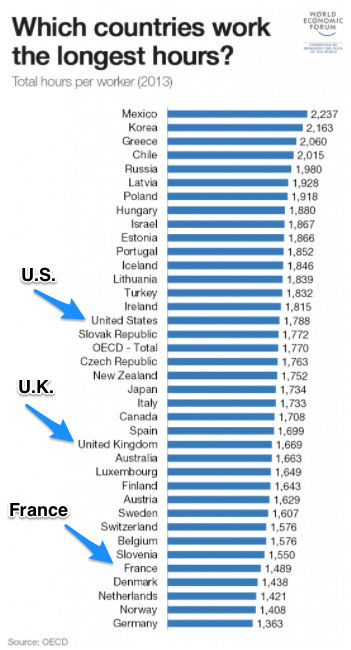Called a stress reducer, the right to disconnect has become French law. Starting last Sunday, firms with more than 50 employees are supposed to create a home email policy. By prohibiting emails during certain hours, they hope to diminish “homework.”
Where are we going? To a camel’s nose in our tent.
Work Hours
As a teacher and writer, I know there are countless ways to calculate work hours. But we can start with formal time on the job. Below, the World Economic Forum graphed OECD countries. You can see that Mexico is at the top and Germany, the bottom:
True of all statistics, there is lots that the numbers hide. While Germany is at the bottom for work hours, its productivity is near the top. As for the types of jobs, the countries vary. For example, in the Netherlands the shorter hours reflect the part-timers that dominate their work force. And also we didn’t note regulatory constraints.
Still though, the overall ranking gives us an accurate takeaway of formal working hours.
Our Bottom Line: The Camel’s Nose
The issues change when we move beyond our hours in the workplace. They take me to asking about the camel’s nose. If his nose is in the tent, will his body soon enter?
When a firm prohibits its email in our home, they are limiting our work time. Less work means more time for family, leisure and sleep. But also, they have placed their nose in our tent.
The U.S. health insurance firm Aetna gives a cash bonus to employees who sleep for more than seven hours during each of 20 nights. Giving us monitors like Fitbits, our bosses help us keep track of our daily exercise and diet. They then can use the data to reward healthy habits.
Commenting on the work/home intersection, one journalist asked if we should call it employee surveillance or corporate wellness incentives. You decide.
My sources and more: Hearing on NPR that France was limiting worker connectivity at home, I wondered about the bigger issues. If you want to consider how far our employers can enter our lives, this Slate article on Aetna and this FT discussion of technological monitors are both thought-provoking.






